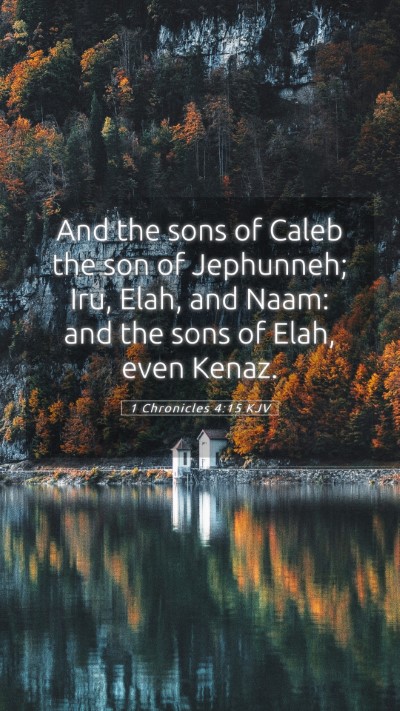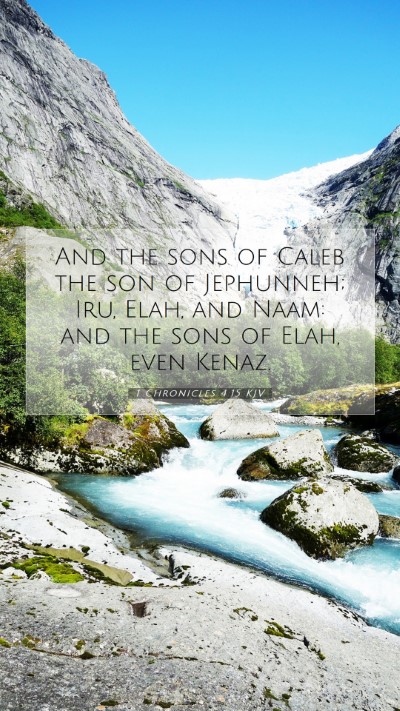Understanding 1 Chronicles 4:15
The verse 1 Chronicles 4:15 reads, "And the sons of Caleb the son of Jephunneh; Iru, Elah, and Naam: and the sons of Jehallelel; Ziph, and Ziphah, Tiria, and Asareel." This verse is a part of the genealogical records presented in the Book of Chronicles, which emphasizes the lineage of individuals as crucial to understanding Israel's history.
Verse Summary and Context
This passage highlights the descendants of Caleb, a significant figure in the Israelite conquest of Canaan—he was one of the twelve spies sent by Moses to scout the land. His lineage, though seemingly a list of names, underscores the importance of family and inheritance in ancient Israel. Genealogies serve to establish identity and claim to land, particularly in the context of God's promises to His people.
Bible Verse Meanings
In understanding 1 Chronicles 4:15, we reflect on several key themes drawn from public domain commentaries:
-
Lineage and Identity: As highlighted in Matthew Henry's commentary, genealogies in Scripture are not merely lists but reflections of divine providence and the fulfillment of God's promises through generations.
-
The Role of Caleb: Albert Barnes notes that Caleb's faithfulness and valor are pivotal, and the mention of his descendants signifies the continuation of his legacy and faith.
-
Faithfulness Passed Down: Adam Clarke emphasizes the importance of the virtues of notable ancestors, suggesting that the faithfulness of Caleb is a model for his descendants and the broader community of Israel.
Scriptural Analysis and Commentary
The importance of Caleb, the son of Jephunneh, is significant in biblical history, especially in the conquest of Canaan (Numbers 14:6-9). His name appears frequently in Scripture, emphasizing the legacy of faith he carried. The sons named in the verse, while individually insignificant in biblical narrative, collectively represent the fulfillment of God’s promises to Caleb. Caleb was rewarded for his faithfulness not only in his own life but also through the continuation of his line—a theme prevalent in many historical books of the Bible.
In-depth Bible Verse Analysis
To gain a deeper understanding of 1 Chronicles 4:15, it’s crucial to look at:
-
Historical Context: The genealogies in Chronicles were recorded post-exilic period to reestablish identity among returning exiles.
-
Theological Significance: These names indicate God’s preservation of a remnant that was faithful, affirming that recognition of heritage is important in Jewish culture, as recognized by Clarke.
-
Connection to the Promised Land: Each name can represent a part of the greater narrative of Israel's possession of the land God promised them, representative of ongoing covenantal faithfulness.
Applications for Modern Believers
Understanding the genealogical lists in the Bible may seem less applicable at first glance; however, they provide valuable insights into faithfulness and the significance of legacy. Here are some applications that can be made:
-
Legacy of Faith: Just as the faithfulness of Caleb is recorded for us, believers today are encouraged to live in such a way that their legacies—whether spiritual, familial, or community-based—reflect faithfulness to God.
-
Importance of Community: The representation of families and their roles reflects the importance of community in pursuing a collective identity in Christ, a theme echoed throughout the New Testament.
-
Faith Amidst Challenges: Caleb's story reminds us of the importance of perseverance and faithfulness in the face of challenges, encouraging believers to maintain their faith and trust in God’s promises.
Related Bible Cross References
Therefore, for further study and understanding, one might look at the following related verses:
- Numbers 14:6-9 - Caleb’s faith when facing giants.
- Joshua 14:6-14 - Caleb claiming his inheritance as a reward for his faith.
- Hebrews 11:1 - The definition of faith as a foundation for understanding God’s promises.
Conclusion
1 Chronicles 4:15, despite being a brief genealogical reference, offers profound insights into the nature of faith, legacy, and the divine promises of God. Through thorough scriptural analysis and a deeper understanding of the historical context, believers can derive rich applications to their spiritual lives today. This verse, like many others, challenges us to consider how we assess our legacy and impact as servants of God in our communities.


